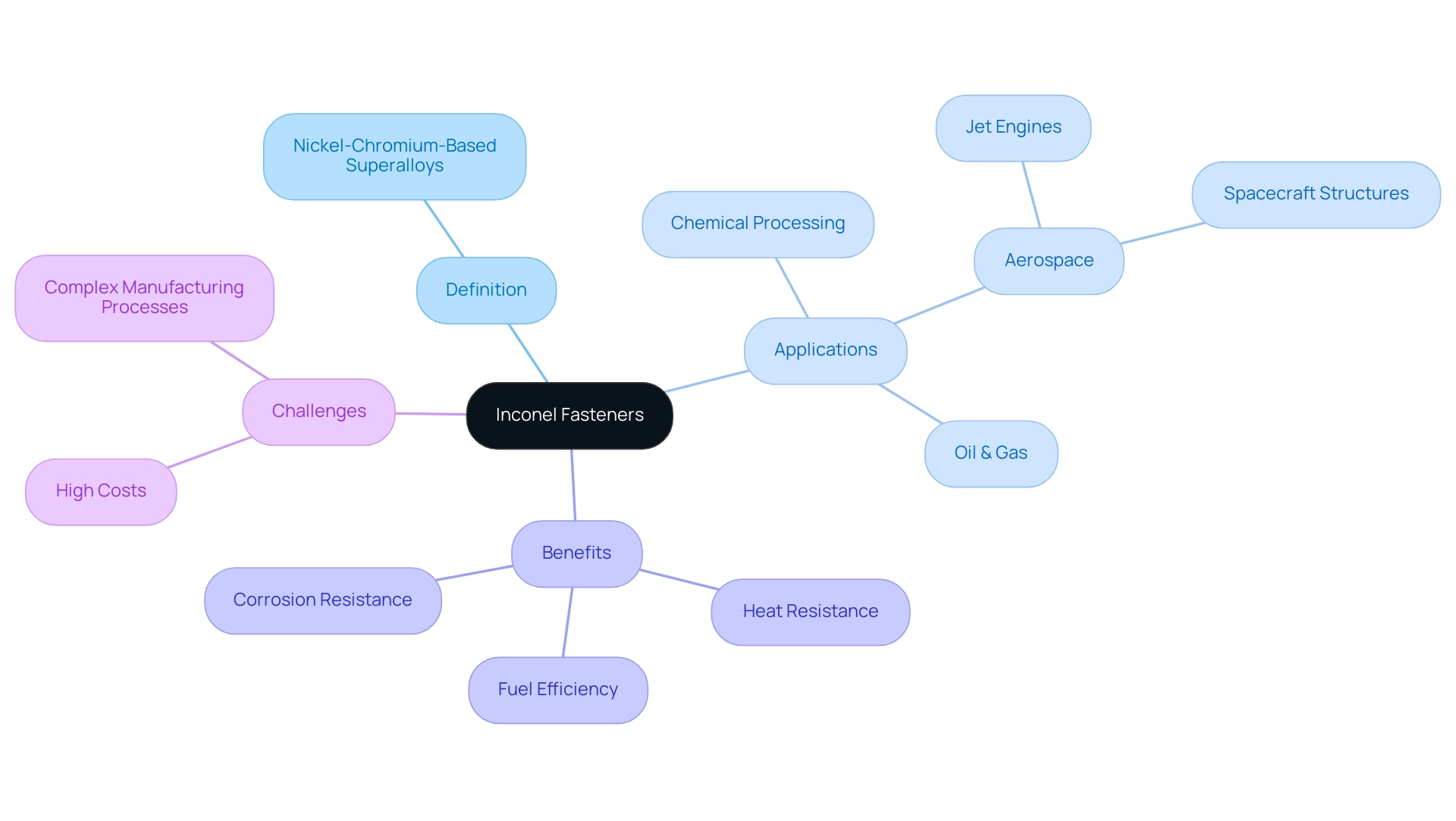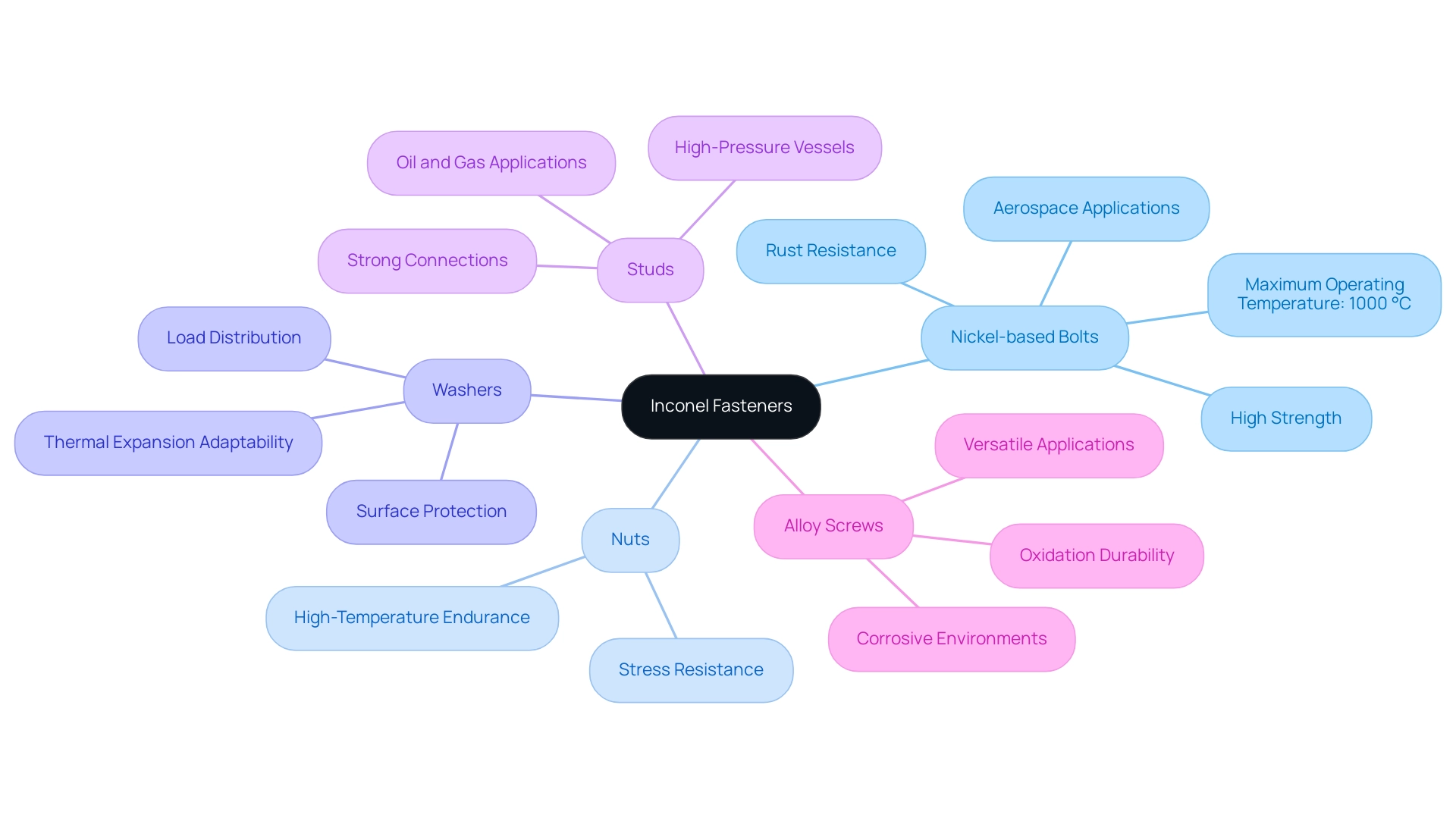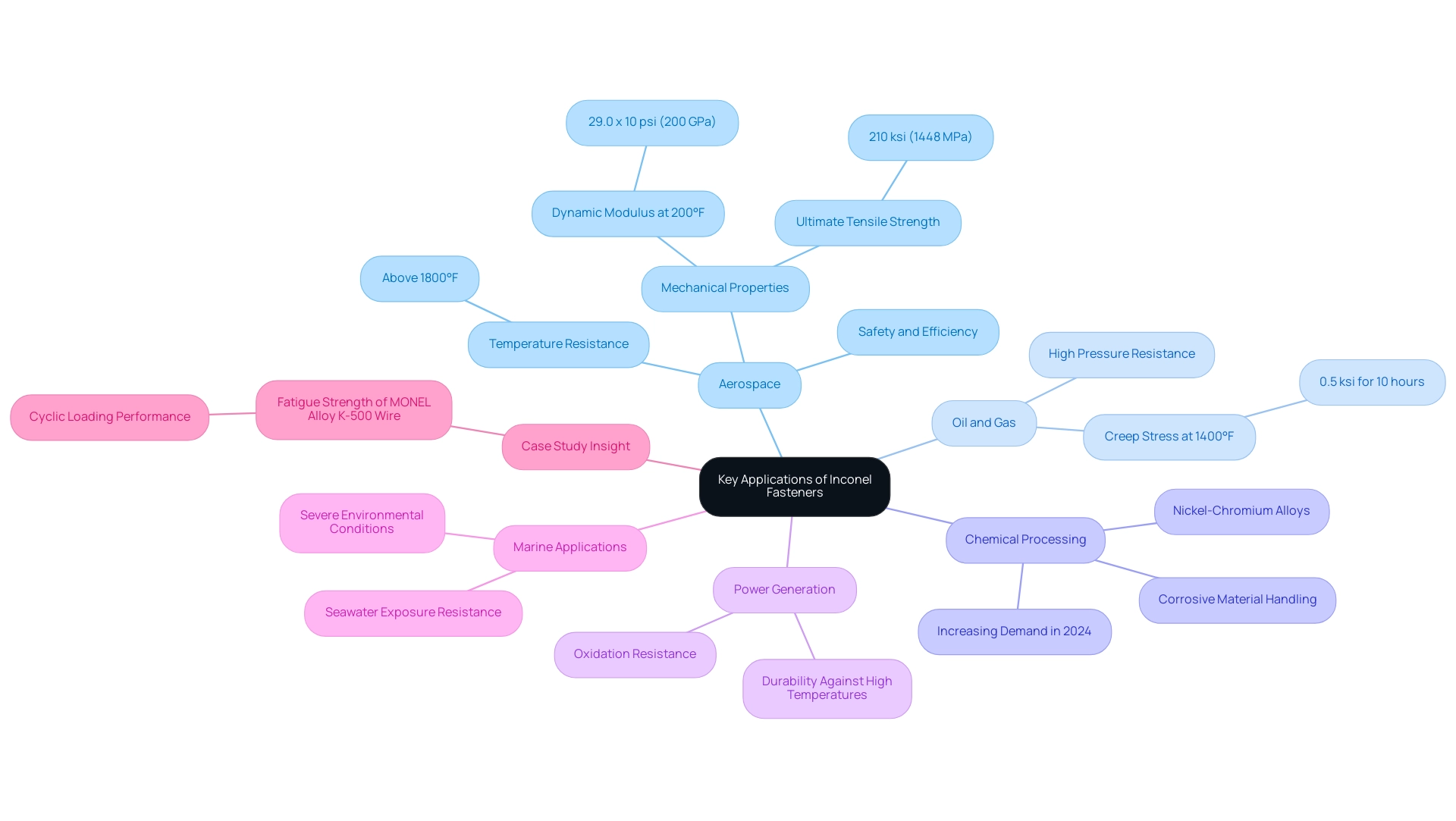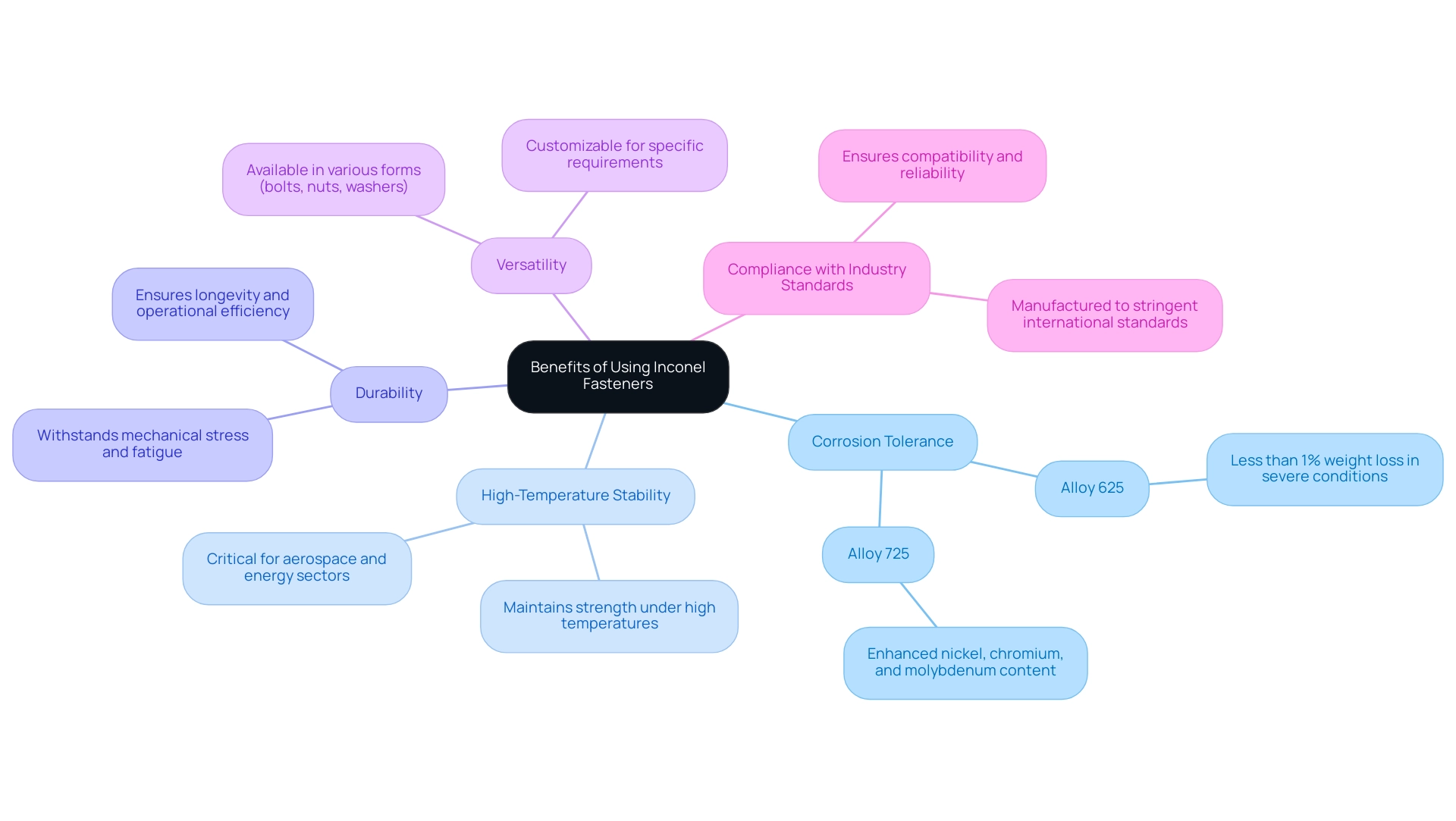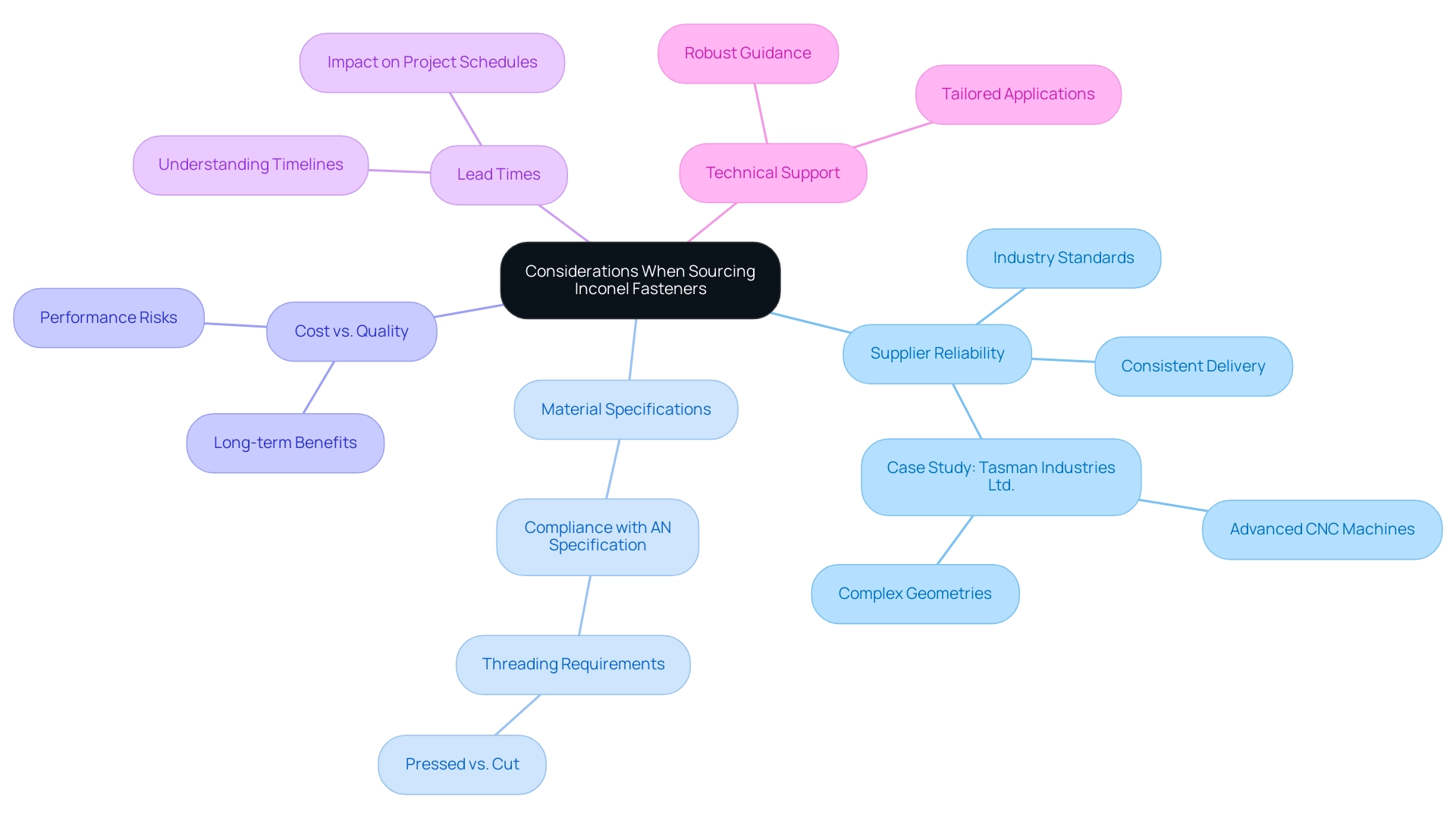Blogs
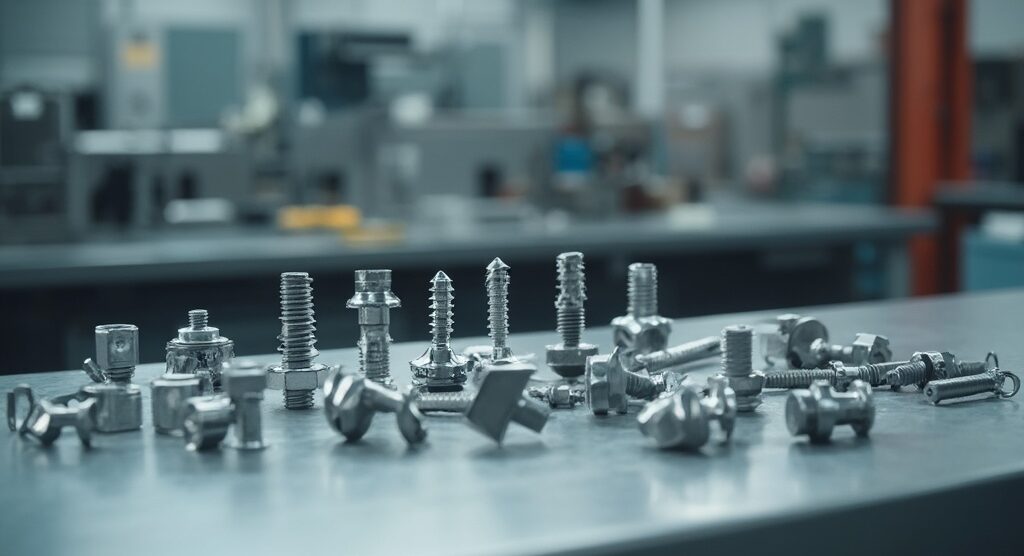
Top 5 Most Common Types of Inconel Fasteners You Should Know
Introduction
Inconel fasteners have emerged as a cornerstone in the realm of industrial applications, particularly in sectors where extreme conditions demand unparalleled performance. Crafted from a specialized family of nickel-chromium-based superalloys, these fasteners are celebrated for their exceptional heat and corrosion resistance, making them indispensable in industries such as aerospace, chemical processing, and oil and gas. As procurement managers face the intricate challenge of selecting the right materials, understanding the pivotal role of Inconel fasteners becomes essential for ensuring reliability and performance.
This article delves into the various types of Inconel fasteners, their critical applications, and the myriad benefits they offer, providing procurement professionals with the insights needed to make informed sourcing decisions in an increasingly competitive market.
Understanding Inconel Fasteners: Definition and Importance
Nickel-chromium-based superalloy components serve as a crucial aspect in industrial applications, designed from a group of austenitic materials recognized for their exceptional heat and corrosion resistance. These high-performance components are indispensable in demanding environments such as aerospace, chemical processing, and oil and gas industries. Notably, the use of nickel alloys, such as certain high-performance materials, can save significant amounts of fuel during the service life of an aircraft, underscoring their importance in aerospace engineering. Their unique ability to retain strength and structural integrity at elevated temperatures ensures reliability where traditional connectors would typically fail. As procurement managers and engineers navigate the complexities of material selection, grasping the critical significance of specific alloy components becomes essential.
Pat Murphy, former President and CEO of Fortive Advanced Healthcare Solutions, emphasizes this relevance by stating, ‘The advancements in materials technology are pivotal for the future of aerospace and beyond.’ Selecting the suitable connectors not only improves the durability of machinery and structures but also optimizes performance in applications that are increasingly reliant on advanced materials.
However, challenges persist, as highlighted in the case study titled ‘Challenges and Future Prospects,’ which discusses the high costs and complex manufacturing processes associated with nickel alloys. Continuous progress in material combinations and processing techniques is anticipated to enhance the utilization of nickel alloys, including other variants, in upcoming aircraft and spacecraft. This makes informed procurement decisions even more crucial as the market for nickel-based fasteners continues to expand.
Exploring the Top 5 Common Types of Inconel Fasteners
Nickel-based Bolts: Known for their remarkable strength and resistance to rust, nickel-based bolts are essential in high-stress uses, especially in aerospace and marine fields. With a maximum operating temperature of 1000 °C, their ability to perform reliably in extreme environments makes them a preferred choice for critical applications where safety and integrity are paramount.
Nuts: Complementing these bolts, these fasteners are engineered to endure similarly harsh conditions. They play a vital role in securing components within high-temperature environments, ensuring that assemblies remain intact even under significant stress and temperature fluctuations.
Washers: Serving as a crucial accessory to bolts and nuts, these washers distribute loads evenly and protect the surfaces being fastened from damage. Their design is particularly beneficial in scenarios prone to thermal expansion, as they maintain structural integrity despite varying temperatures.
Studs: These components are crucial for uses requiring strong connections, such as in oil and gas pipelines and high-pressure vessels. Alloy studs offer a durable fastening solution capable of withstanding the most challenging conditions, ensuring reliability and safety in critical infrastructure. Steve Cramp, Managing Director at TCO Group, observes that WIPCO has consistently supplied components punctually with no reported quality problems, highlighting the dependability of these fasteners in industrial uses.
Alloy screws: Versatile and adaptable, these screws find applications across diverse fields, from automotive to electronics. Their exceptional oxidation durability makes them ideal for environments where exposure to corrosive elements is a concern, thereby extending the lifespan of the components they secure. As noted by Sonsiree Driskel, “The best part of doing business with WIPCO is the collaboration. They let us know ahead of time when issues arise, delays, or if they have questions about drawings. I appreciate their feedback when parts that have not been made in a while, they provide manufacturing tips. Their parts are of quality, very little issues when their parts are delivered to our facility.”
By comprehending these different kinds of metal connectors, procurement managers can make informed sourcing decisions that align with both performance requirements and compliance standards, thereby securing reliable components for their projects.
Key Applications of Inconel Fasteners
Specialty connectors are essential in various sectors, credited for their remarkable mechanical characteristics and durability under extreme conditions. Key applications include:
Aerospace: Specialized connectors are essential in aircraft engines and structural components, engineered to withstand temperatures surpassing 1800°F. Their ability to maintain integrity under such conditions is exemplified by a dynamic modulus of elasticity at 200°F of 29.0 x 10 psi (200 GPA) and at 1800°F is 17.4 x 10 psi (134 GPA). Experts in aerospace emphasize the necessity of these components, stating their performance directly impacts safety and efficiency in flight operations. Additionally, the ultimate tensile strength of these metal connectors is typically 210 ksi (1448 MPa), reinforcing their reliability in critical applications.
Oil and Gas: In the oil and gas sector, these connectors are employed in drilling and production equipment, where they are exposed to high pressures and aggressive chemicals. The 10-hour creep stress at 1400°F is recorded at 0.5 ksi, demonstrating their dependability for extended use in demanding environments.
Chemical Processing: Nickel-chromium alloy components play a vital role in reactors and piping systems that convey corrosive materials. The demand for these connectors in chemical processing is anticipated to increase in 2024, propelled by their capability to provide long-term operational reliability in challenging environments.
Power Generation: Essential for turbines and heat exchangers, these alloys offer unmatched durability against high temperatures and oxidation, ensuring safety and efficiency in power generation applications.
Marine Applications: The utilization of these materials in shipbuilding and offshore platforms addresses the challenges posed by seawater exposure and severe environmental conditions, reinforcing their vital role in marine operations.
Case Study Insight: A case study focusing on the fatigue strength of commercially produced MONEL alloy K-500 wire highlights its performance under cyclic loading. The wire’s fatigue strength was assessed with a rotating-wire arc-fatigue machine, offering insights into how comparable materials, including specific alloys, behave under challenging conditions.
By comprehending these particular uses and the supporting data, procurement managers can make informed choices regarding the selection of suitable materials tailored to their industry needs.
Benefits of Using Inconel Fasteners
These connectors are distinguished as a leading option for challenging applications because of a variety of persuasive advantages:
- Corrosion Tolerance: The distinctive makeup provides exceptional protection against oxidation and corrosion. For instance, alloy 625 features a corrosion durability rating that is considerably greater than that of numerous standard metals, with less than 1% weight loss in severe conditions over prolonged durations. Alloy 725, with its improved nickel, chromium, and molybdenum composition, provides exceptional corrosion resistance relative to other substances, making it suitable for conditions that would test inferior alloys.
- High-Temperature Stability: These components excel in preserving strength and integrity under high temperatures, ensuring dependability where other materials may fail. This trait is vital in sectors like aerospace and energy, where working conditions can be severe.
- Durability: Crafted to withstand mechanical stress and fatigue, these connectors greatly diminish the likelihood of component failure in essential uses. Their robust nature ensures longevity, which is essential for maintaining operational efficiency.
- Versatility: Available in various forms—bolts, nuts, washers, and more—these components can be customized to meet specific requirements, providing flexibility for procurement managers in diverse industrial contexts.
- Compliance with Industry Standards: Manufactured to adhere to stringent international standards, these items ensure compatibility and reliability in regulated industries, offering peace of mind for those responsible for procurement.
A real-world example of the importance of using reliable components is illustrated by a user experience with a 1987 Lotus Turbo Esprit, which lost a nut on the passenger side radius arm, leading to significant mechanical issues. Such incidents emphasize the importance of premium connectors similar to those made from a high-performance alloy. Furthermore, a case study on 725 machine screws has shown that they are positioned as a superior alternative for applications requiring high corrosion resistance, further validating the choice of this material in critical applications.
With these advantages, these components become indispensable in a variety of industrial applications, empowering procurement managers to make strategic and informed decisions.
Considerations When Sourcing Inconel Fasteners
When sourcing Inconel components, procurement managers should evaluate several critical factors to ensure optimal selection and performance:
Supplier Reliability: Prioritize suppliers known for their consistent delivery of high-quality Inconel products that adhere to industry standards. Supplier reliability is crucial, as noted by industry leaders who emphasize that,
We harness the power of advanced CNC machines, capable of executing the most complex geometries with precision
— Tasman Industries Ltd. For instance, a case study involving Tasman Industries demonstrated their ability to meet tight deadlines while maintaining product quality, reinforcing their reputation as a reliable supplier.Material Specifications: Verify that components comply with relevant specifications and certifications. For instance, the AN specification for Army-Navy bolts mandates that threading be pressed rather than cut, ensuring superior quality and performance.
Cost vs. Quality: Assess the balance between cost and quality, recognizing that choosing less expensive alternatives may jeopardize performance in critical uses. A thorough cost analysis can reveal the long-term benefits of investing in quality. For instance, a comparison between high-performance components and standard steel options indicated that although high-performance materials might entail a greater initial expense, their durability and corrosion resistance result in reduced maintenance expenses in the long run.
Lead Times: Be aware of the lead times connected to procuring high-performance components, as any delays could negatively impact project schedules. Understanding these timelines allows for better project management.
Technical Support: Engage suppliers who provide robust technical support and guidance tailored to specific applications. This support is invaluable in selecting the most appropriate fasteners for unique project requirements.
By carefully considering these factors, procurement managers can enhance their sourcing strategies, ensuring they acquire the right Inconel fasteners to meet their project specifications effectively.
Conclusion
Inconel fasteners are integral to various industries, owing to their unique properties and performance characteristics. Their exceptional heat and corrosion resistance make them invaluable in demanding environments, particularly in aerospace, chemical processing, and oil and gas applications. Understanding the different types of Inconel fasteners—bolts, nuts, washers, studs, and screws—allows procurement managers to align their sourcing decisions with specific performance requirements, ensuring reliability and safety in critical applications.
The applications of Inconel fasteners extend beyond their mechanical properties; they play a crucial role in enhancing operational efficiency and longevity in high-stress scenarios. With increasing reliance on advanced materials in sectors such as aerospace and power generation, the choice of Inconel fasteners becomes even more vital. The benefits they offer, including superior corrosion resistance, high-temperature stability, and compliance with industry standards, reinforce their status as a preferred option for procurement professionals.
When sourcing Inconel fasteners, careful consideration of supplier reliability, material specifications, and cost versus quality is essential. Engaging with reputable suppliers and understanding the critical factors that influence performance will empower procurement managers to make informed decisions. In a landscape where material selection can significantly impact project outcomes, prioritizing quality and reliability in fasteners is a strategic necessity that will ensure long-term success in industrial applications.

